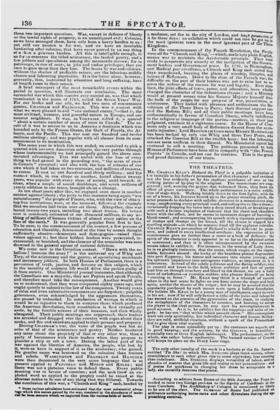THE THEATRES.
Ma. CHARLES KEAN'S Richard the Third is a palpable imitation of Cie imitable in his father's personation of that character ; and rendered not the less evidently so by his studious avoidance of one or two striking points of by-play in the original. The mannerisms are exag. gerated ; and, wanting the genius that redeemed them, they have the effect of grave caricature. The whole performance is a mete exhibi. tion of stage-trick. Walking briskly down to the foot-lights, with the air of a bravo, his features braced tip to the proper scowling pitch, the actor proceeds to declaim with syllabic slowness in a monotonous sing. song—emphasizing every principal word; and rolling the rs like a drum occasionally dropping his voice into a deep. toned drawl, or breaking out with such a furious explosion of violence that his chest and shoulden heave with the effort, and he seems in imminent danger of bursting blood-vessel; and accompanying, his speech with a vigorous pantomime of stamps and thumps on the breast, till the climax is capped by a
startling attitude—in which he remains fixed till the applause subsides.
CHARLES KEAN'S personation of Richard is wholly deficient in great. ness, and indeed in every intellectual attiibute : the expression of his
countenance goes no further than a sneer or a look of defiance: the
spirit of the character is only apparent in so far as the physical action is concerned ; and then it is often misrepresented by the excessive means taken to exhibit it. For instance, in the wooing of Lady Anne, he is so glaringly insincere, that the scene, which verges on the impro- bable, becomes absurd: the levity of the heartless plotter degenerates
into pert flippancy; his taunts and sarcasms into coarse jeering; and his splenetic impatience into outrageous violence, as impotent as it is indecorous. Instead of the subtle palitican and the daring soldier, wise in council and brave in the field, whose ambition and lust of power lead him on through treachery and blood to the throne, we see a bully hero of melodrama—a common stalker, who plumes himself on being
"cunning in fence." Mr. KEAN may think it a triumph of success when in the last scene he fights on one knee across the stage and back again, amidst the shouts of the vulgar ; but he may be assured that the popularity purchased by such means rests upon a hollow foundation. We believe Mr. KEAN to be a young man of intelligence, eager to excel in his art: now if he will only bestow a tithe of the pains and labour he has wasted on the practice of the gymnastics of the stage, in studying the metaphysics of the characters he assumes, und learning to merge the player in the ideal person, he may turn his accomplishments IS good account. As it is, he exhibits but the trappings and suits of tra- gedy: he has not "that within which passeth show." His conceptions want not only spirituality, but individual character and human feeling: • they are cold, artificial creations, without a spark of the Promethean fire to give them vital warmth. The play is most splendidly got up : the costumes are superb, ond in good keeping; and the scenery, by the GRIEVES, is beautiful— especially two or three English landscapes. The performance, on the whole, was rather below mediocrity. The bastard version of Cons still keeps its place on the Drury Lane stage.


























 Previous page
Previous page